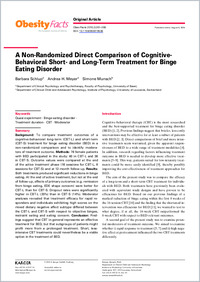A Non-Randomized Direct Comparison of Cognitive-Behavioral Short- and Long-Term Treatment for Binge Eating Disorder
- Schlup, Barbara Universität Basel
- Meyer , Andrea H. Universität Basel
- Munsch , Simone Universität Fribourg, Schweiz
-
06.08.2010
Published in:
- Obesity Facts. - 2010, vol. 3, p. 261–266
English
BACKGROUND: To compare treatment outcomes of a cognitive-behavioral long-term (CBT-L) and short-term (CBT-S) treatment for binge eating disorder (BED) in a non-randomized comparison and to identify moderators of treatment outcome. METHODS: 76 female patients with BED participated in the study: 40 in CBT-L and 36 in CBT-S. Outcome values were compared at the end of the active treatment phase (16 sessions for CBT-L, 8 sessions for CBT-S) and at 12-month follow-up. RESULTS: Both treatments produced significant reductions in binge eating. At the end of active treatment, but not at the end of follow-up, effects of primary outcomes (e.g. remission from binge eating, EDE shape concern) were better for CBT-L than for CBT-S. Dropout rates were significantly higher in CBT-L (35%) than in CBT-S (14%). Moderator analyses revealed that treatment efficacy for rapid responders and individuals exhibiting high scores on the mixed dietary negative affect subtype differed between the CBT-L and CBT-S with respect to objective binges, restraint eating and eating concern. CONCLUSION: Findings suggest that CBT in general represents an effective treatment for BED, but that subgroups of patients might profit more from a prolonged treatment. Short, less-intensive CBT treatments could nevertheless be a viable option in the treatment of BED.
- Faculty
- Faculté des lettres et des sciences humaines
- Department
- Département de Psychologie
- Language
-
- English
- Classification
- Psychology
- License
-
License undefined
- Identifiers
-
- RERO DOC 323594
- DOI 10.1159/000319538
- Persistent URL
- https://folia.unifr.ch/unifr/documents/307172
Statistics
Document views: 134
File downloads:
- Texte intégral: 160
